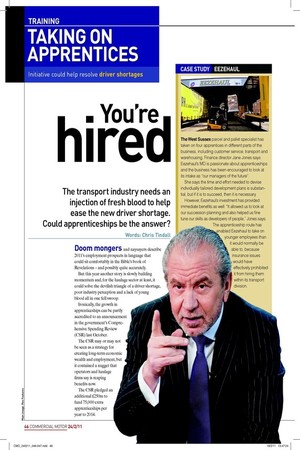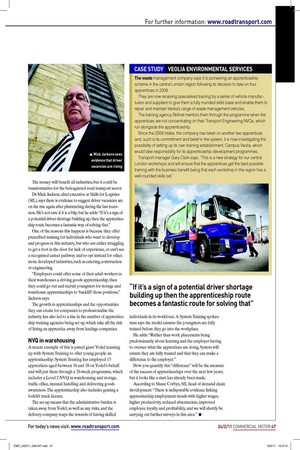You’re
Page 38

Page 39

If you've noticed an error in this article please click here to report it so we can fix it.
re
The transport industry needs an injection of fresh blood to help ease the new driver shortage. Could apprenticeships be the answer?
Words: Chris Tindall
Doom mongers and naysayers describe 2011’s employment prospects in language that could sit comfortably in the Bible’s book of Revelations – and possibly quite accurately.
But this year another story is slowly building momentum and, for the haulage sector at least, it could solve the devilish triangle of a driver shortage, poor industry perception and a lack of young blood all in one fell swoop.
Ironically, the growth in apprenticeships can be partly accredited to an announcement in the government’s Compre hensive Spending Review (CSR) last October.
The CSR may or may not be seen as a strategy for creating long-term economic wealth and employment, but it contained a nugget that operators and haulage irms say is reaping beneits now.
The CSR pledged an additional £250m to fund 75,000 extra apprenticeships per year to 2014. The money will beneit all industries, but it could be transformative for the beleaguered road transport sector.
Dr Mick Jackson, chief executive at Skills for Logistics (SfL), says there is evidence to suggest driver vacancies are on the rise again after plummeting during the last recession. He’s not sure if it is a blip, but he adds: “If it’s a sign of a potential driver shortage building up, then the apprenticeship route becomes a fantastic way of solving that.” One of the reasons this happens is because they offer prescribed training for individuals who want to develop and progress in this industry, but who are either struggling to get a foot in the door for lack of experience, or can’t see a recognised career pathway and so opt instead for other, more developed industries, such as catering, construction or engineering.
“Employers could offer some of their adult workers in their warehouses a driving goods apprenticeship; then they could go out and recruit youngsters for storage and warehouse apprenticeships to ‘backill’ those positions,” Jackson says.
The growth in apprenticeships and the opportunities they can create for companies to professionalise the industry has also led to a rise in the number of apprenticeship training agencies being set up, which take all the risk of hiring an apprentice away from haulage companies.
NVQ in warehousing
A recent example of this is parcel giant Yodel teaming up with System Training to offer young people an apprenticeship. System Training has employed 13 apprentices aged between 16 and 18 on Yodel’s behalf and will put them through a 26-week programme, which includes a Level 2 NVQ in warehousing and storage, trafic ofice, manual handling and delivering goods awareness. The apprenticeship also includes gaining a forklift truck licence.
The set-up means that the administrative burden is taken away from Yodel, as well as any risks, and the delivery company reaps the rewards of having skilled individuals in its workforce. A System Training spokesman says the model ensures the youngsters are fully trained before they go into the workplace.
He adds: “Rather than work placements being predominantly about learning and the employer having to oversee what the apprentices are doing, System will ensure they are fully trained and that they can make a difference to the employer.” How you quantify this “difference” will be the measure of the success of apprenticeships over the next few years, but it looks like a start has already been made.
According to Shane Corbyn, SfL head of demand chain development: “There is indisputable evidence linking apprenticeship employment trends with higher wages, higher productivity, reduced absenteeism, improved employee loyalty and proitability, and we will shortly be carrying out further surveys in this area.” ■











































